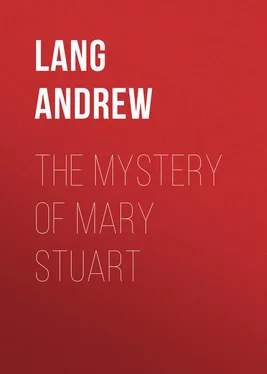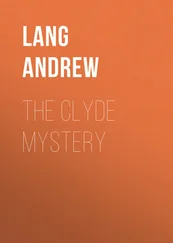Andrew Lang - The Mystery of Mary Stuart
Здесь есть возможность читать онлайн «Andrew Lang - The Mystery of Mary Stuart» — ознакомительный отрывок электронной книги совершенно бесплатно, а после прочтения отрывка купить полную версию. В некоторых случаях можно слушать аудио, скачать через торрент в формате fb2 и присутствует краткое содержание. Жанр: foreign_antique, foreign_prose, на английском языке. Описание произведения, (предисловие) а так же отзывы посетителей доступны на портале библиотеки ЛибКат.
- Название:The Mystery of Mary Stuart
- Автор:
- Жанр:
- Год:неизвестен
- ISBN:нет данных
- Рейтинг книги:4 / 5. Голосов: 1
-
Избранное:Добавить в избранное
- Отзывы:
-
Ваша оценка:
- 80
- 1
- 2
- 3
- 4
- 5
The Mystery of Mary Stuart: краткое содержание, описание и аннотация
Предлагаем к чтению аннотацию, описание, краткое содержание или предисловие (зависит от того, что написал сам автор книги «The Mystery of Mary Stuart»). Если вы не нашли необходимую информацию о книге — напишите в комментариях, мы постараемся отыскать её.
The Mystery of Mary Stuart — читать онлайн ознакомительный отрывок
Ниже представлен текст книги, разбитый по страницам. Система сохранения места последней прочитанной страницы, позволяет с удобством читать онлайн бесплатно книгу «The Mystery of Mary Stuart», без необходимости каждый раз заново искать на чём Вы остановились. Поставьте закладку, и сможете в любой момент перейти на страницу, на которой закончили чтение.
Интервал:
Закладка:
Her more than masculine courage her enemies have never denied. Her resolution was incapable of despair; ‘her last word should be that of a Queen.’ Her plighted promise she revered, but, in such an age, a woman’s weapon was deceit.
She was the centre and pivot of innumerable intrigues. The fierce nobles looked on her as a means for procuring lands, office, and revenge on their feudal enemies. To the fiercer ministers she was an idolatress, who ought to die the death, and, meanwhile, must be thwarted and insulted. To France, Spain, and Austria she was a piece in the game of diplomatic chess. To the Pope she seemed an instrument that might win back both Scotland and England for the Church, while the English Catholics regarded her as either their lawful or their future Queen. To Elizabeth she was, naturally, and inevitably, and, in part, by her own fault, a deadly rival, whatever feline caresses might pass between them: gifts of Mary’s heart, in a heart-shaped diamond; Elizabeth’s diamond ‘like a rock,’ a rock in which was no refuge. Yet Mary was of a nature so large and unsuspicious that, on the strength of a ring and a promise, she trusted herself to Elizabeth, contrary to the advice of her staunchest adherents. She was no natural dissembler, and with difficulty came to understand that others could be false. Her sense of honour might become perverted, but she had a strong native sense of honour.
One thing this woman wanted, a master. Even before Darnley and she were wedded, at least publicly, Randolph wrote, ‘All honour that may be attributed unto any man by a wife, he hath it wholly and fully.’ In her authentic letters to Norfolk, when, a captive in England, she regarded herself as betrothed to him, we find her adopting an attitude of submissive obedience. The same tone pervades the disputed Casket Letters, to Bothwell, and is certainly in singular consonance with the later, and genuine epistles to Norfolk. But the tone – if the Casket Letters are forged – may have been borrowed from what was known of her early submission to Darnley.
The second dramatis persona is Darnley, ‘The Young Fool.’ Concerning Darnley but little is recorded in comparison with what we know of Mary. He was the son, by the Earl of Lennox, a royal Stewart, of that daughter whom Margaret Tudor, sister of Henry VIII., and widow of James IV., bore to her second husband, the Earl of Angus. Darnley’s father regarded himself as next to the Scottish crown, for the real nearest heir, the head of the Hamiltons, the Duke of Chatelherault, Lennox chose to consider as illegitimate. After playing a double and dishonest part in the troubled years following the death of James V., Lennox retired to England with his wife, a victim of the suspicions of Elizabeth. [6] The papers used by Lennox in getting up his indictment against Mary are new materials, which we often have occasion to cite.
The education of his son, Henry, Lord Darnley, seems to have been excellent, as far as the intellect and the body are concerned. The letter which, as a child of nine, he wrote to Mary Tudor, speaking of a work of his own, ‘The New Utopia,’ is in the new ‘Roman’ hand, carried to the perfection of copperplate. The Lennox MSS. say that ‘the Queen was stricken with the dart of love by the comliness of his sweet behaviour, personage, wit, and vertuous qualities, as well in languages [7] Mr. Henderson doubts if Darnley knew French.
and lettered sciencies, as also in the art of music, dancing, and playing on instruments.’ When his murderers had left his room at midnight, his last midnight, his chamber-child begged him to play, while a psalm was sung, but his hand, he replied, was out for the lute, so say the Lennox Papers. Physically he was ‘a comely Prince of a fair and large stature, pleasant in countenance … well exercised in martial pastimes upon horseback as any Prince of that age.’ The Spanish Ambassador calls him ‘an amiable youth.’ But it is plain that ‘the long lad,’ the gentil hutaudeau , with his girlish bloom, and early tendency to fulness of body, was a spoiled child. His mother, a passionate intriguer, kept this before him, that, as great-grandson of Henry VII., and as cousin of Mary Stuart, he should unite the two crowns. There were Catholics enough in England to flatter the pride of a future king, though now in exile. This Prince in partibus , like his far-away descendant, Prince Charles Edward, combined a show of charming manners, when he chose to charm, with an arrogant and violent petulance, when he deemed it safe to be insulting. At his first arrival in Scotland he won golden opinions, ‘his courteous dealing with all men is well spoken of.’ As his favour with Mary waxed he ‘dealt blows where he knew that they would be taken;’ he is said to have drawn his dagger on an official who brought him a disappointing message, and his foolish freedom of tongue gave Moray the alarm. It was soon prophesied that he ‘could not continue long.’ ‘To all honest men he is intolerable, and almost forgetful of her already, that has adventured so much for his sake. What shall become of her or what life with him she shall lead, that already taketh so much upon him as to control and command her, I leave it to others to think.’ So Randolph, the English Ambassador, wrote as early as May, 1565. She was ‘blinded, transported, carried I know not whither or which way, to her own confusion and destruction:’ words of omen that were fulfilled.
Whether Elizabeth let Darnley go to Scotland merely for Mary’s entanglement, whether Mary fell in love with the handsome accomplished lad (as Randolph seems to prove) or not, are questions then, and now, disputed. The Lennox Papers, declaring that she was smitten by the arrow of love; and her own conduct, at first, make it highly probable that she entertained for the gentil hutaudeau a passion, or a passionate caprice.
Darnley, at least, acted like a new chemical agent in the development of Mary’s character. She had been singularly long-suffering; she had borne the insults and outrages of the extreme Protestants; she had leaned on her brother, Moray, and on Lethington; following or even leading these advisers to the ruin of Huntly, her chief coreligionist. Though constantly professing, openly to Knox, secretly to the Pope, her desire to succour the ancient Church, she was obviously regarded, in Papal circles, as slack in the work. She had been pliant, she had endured the long calculated delays of Elizabeth, as to her marriage, with patience; but, so soon as Darnley crossed her path, she became resolute, even reckless. Despite the opposition, interested, or religious, or based on the pretext of religion, which Moray and his allies offered, Mary wedded Darnley. She found him a petulant, ambitious boy; sullen, suspicious, resentful, swayed by the ambition to be a king in earnest, but too indolent in affairs for the business of a king.
At tennis, with Riccio, or while exercising his great horses, his favourite amusement, Darnley was pining to use his jewelled dagger. In the feverish days before the deed it is probable that he kept his courage screwed up by the use of stimulants, to which he was addicted. That he devoted himself to loose promiscuous intrigue injurious to his health, is not established, though, when her child was born, Mary warned Darnley that the babe was ‘only too much his son,’ perhaps with a foreboding of hereditary disease. A satirist called Darnley ‘the leper:’ leprosy being confounded with ‘la grosse vérole.’ Mary, who had fainting fits, was said to be epileptic.
Darnley, according to Lennox, represented himself as pure in this regard, nor have we any valid evidence to the contrary. But his word was absolutely worthless.
Outraged and harassed, broken, at last, in health, in constant pain, expressing herself in hysterical outbursts of despair and desire for death, Mary needed no passion for Bothwell to make her long for freedom from the young fool. From his sick-bed in Glasgow, as we shall see, he sent, by a messenger, a cutting verbal taunt to the Queen; so his own friends declare, they who call Darnley ‘that innocent lamb.’ It is not wonderful if, in an age of treachery and revenge, the character of Mary now broke down. ‘I would not do it to him for my own revenge. My heart bleeds at it,’ she says to Bothwell, in the Casket Letter II., if that was written by her. But, whatever her part in it, the deed was done.
Читать дальшеИнтервал:
Закладка:
Похожие книги на «The Mystery of Mary Stuart»
Представляем Вашему вниманию похожие книги на «The Mystery of Mary Stuart» списком для выбора. Мы отобрали схожую по названию и смыслу литературу в надежде предоставить читателям больше вариантов отыскать новые, интересные, ещё непрочитанные произведения.
Обсуждение, отзывы о книге «The Mystery of Mary Stuart» и просто собственные мнения читателей. Оставьте ваши комментарии, напишите, что Вы думаете о произведении, его смысле или главных героях. Укажите что конкретно понравилось, а что нет, и почему Вы так считаете.












